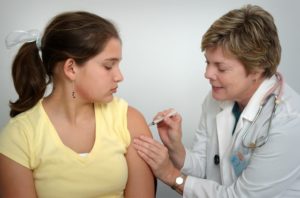The National Vaccine Injury Compensation Program (NVICP) was established by Congress in 1986 to protect persons injured by vaccines. At the time the law was passed, some pharmaceutical companies considered reducing or eliminating production of certain vaccines in response to lawsuits. Congress passed the law establishing this program to ensure a continued supply of these vaccines.

The NVICP is a “no fault” program, in which individuals who qualify to bring a claim do not need to prove that a vaccine was defective or that the manufacturer was negligent; only that certain recognized injuries were sustained close in time to the administration of a vaccine covered by the program.
According to the Centers for Disease Control, the risk of experiencing a severe allergic reaction that would be covered under the NVICP is “1 or less than 1 out of 1 million doses.” Vaccinations are considered safe, and patients should consult with a physician to follow the recommended vaccination schedules.
In order to receive an award under NVICP, an individual must demonstrate that they have received one of the listed covered vaccines, and that they have sustained an injury within a specified period of time. If both are established, then it is presumed that the vaccine caused the injury.
Which vaccines are covered under NVICP?
- Diphtheria/Pertussis (e.g., DTP, DTaP, Tdap, DT, Td, TT)
- Haemophilus influenza type b polysaccharide conjugate vaccines (e.g., Hib)
- Hepatitis A (e.g., HAV)
- Hepatitis B (e.g., HBV)
- Human papillomavirus (e.g., HPV)
- Seasonal influenza (e.g., Flu)
- Measles/Mumps/Rubella (e.g., MMR, MR, M)
- Meningococcal (e.g., MCV4, ,PMSV4, MenB-FHbp, MenB-4C)
- Pneumococcal conjugate (e.g., PCV)
- Polio (e.g., OPV or IPB)
- Rotavirus (e.g., RV)
- Tetanus (e.g., Td)
- Varicella (e.g., VAR)
Additional vaccines or countermeasures may be covered under the Countermeasures Injury Compensation Program.[1]
The injured party may file a claim for compensation if the injury lasted for more than six months following the vaccination, resulted in an inpatient hospitalization and surgical intervention, or resulted in death. The Vaccine Injury Table[2] provides a list of covered vaccines and their associated injuries to help people determine if they qualify for compensation.
There are time limits on filing to recover under the NVICP. Generally, the petition must be filed within three years after the first symptom of the alleged injury, or within two years of the death and four years after the first symptom of the alleged injury that resulted in death. It is always important to check any time limits that might affect your ability to make a claim for any injury. If the vaccine believed to have caused the injury is one listed as a covered vaccine under NVICP, the injured party may not pursue a claim through the tort process in the courts until they have begun the NVICP process. They may thereafter elect to exit the program, but there are highly specific guidelines and procedures for doing so.
How do I file a claim with NVICP?
- An individual files a petition with the U.S. Court of Federal Claims
- Medical staff from the Department of Health and Human Services reviews the petition, determines if it meets the criteria under the program, and makes an initial recommendation
- The Department of Justice prepares a report for the Court, including the HHS recommendation and legal analysis
- The report is reviewed by a Special Master, who often holds a hearing to determine if compensation should be awarded and in what amount.
- If compensation is awarded by the Special Master, the Court orders HHS to award the compensation and may award attorneys’ fees and costs.
- If a petition is rejected (or if the individual withdraws from the program under certain conditions), the individual may file a claim in civil court against the vaccine company and/or the health care provider who administered the vaccine.
Individuals may bring their claim on their own or through an attorney. A filing fee may be required. A list of attorneys who specialize in working with petitioners and the program is maintained by the Court.[3] As with many government programs, there are specific deadlines that must be met under the NVICP. It is highly recommended that anyone considering filing a claim under the program consult an attorney who specializes in such claims at an early date, to make sure that no critical deadlines are missed.
[2] https://www.hrsa.gov/sites/default/files/vaccinecompensation/vaccineinjurytable.pdf



